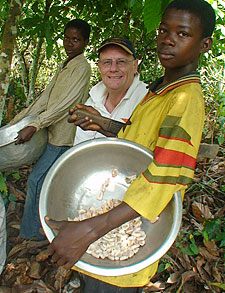 World Vision Australia Chief Executive Tim Costello has warned Australians to be aware of chocolate's hidden dangers as they celebrate Easter this year.
World Vision Australia Chief Executive Tim Costello has warned Australians to be aware of chocolate's hidden dangers as they celebrate Easter this year.
"Chocolate is a luxury that adds to our waistline and often makes us feel guilty," he says.
"Yet if people knew about the exploitation and dangers kids in the cocoa fields are forced to endure, chocolate would also make them feel sick."
It is estimated that in the West African nation of the Ivory Coast alone more than 600,000 children work on cocoa fields.
Research reveals that in the Ivory Coast and Ghana, which together produce 60 per cent of the world's cocoa, up to 80 per cent of children in the cocoa fields are being exposed to dangerous practices such as unprotected use of chemicals, carrying heavy loads, brush burning and using machetes. About half of these children do not attend school.
There is also evidence of children being trafficked. The study estimates up to 12,000 children had been trafficked for cocoa in West Africa.
"Police in the Ivory Coast have liberated more than 200 children in just 12 months," Mr Costello reveals.
"In one case children were smuggled into the country in a fake ambulance."
Where World Vision comes in
World Vision Australia has launched a major campaign to highlight child exploitation and trafficking in the harvesting of cocoa for chocolate.
The focus on chocolate is part of World Vision's new "Don't Trade Lives' campaign, designed to focus public attention on the modern day trafficking and enslavement of people across the world.
"[It's] more than 200 years after British parliamentarian and committed Christian William Wilberforce successfully campaigned for the abolition of state-sanctioned slavery, [yet] slavery still exists today," Mr Costello laments.
"Indeed across the world there are more people trapped in slavery today, by some estimates up to 21 million, than during the whole 400-year trans-Atlantic slave trade."
Mr Costello wants to stress that "salvation is not only individual, personal, and spiritual, it was also corporate, social, and physical".
"As it did for the Abolitionists and Christian social reformers, the modern slave trade calls us again to a gospel which is not just about what happens when we die nor how close we feel to Jesus in our worship; it is a gospel which seeks salvation from the systems which would dehumanise children and promote disparity between the rich and the poor," he says.
[url=http://sydneyanglicans.net/events/world_vision_church_leaders_breakfast/]http://sydneyanglicans.net/events/world_vision_church_leaders_breakfast/[/url]
For more information visit the "Don't trade lives' website.



















